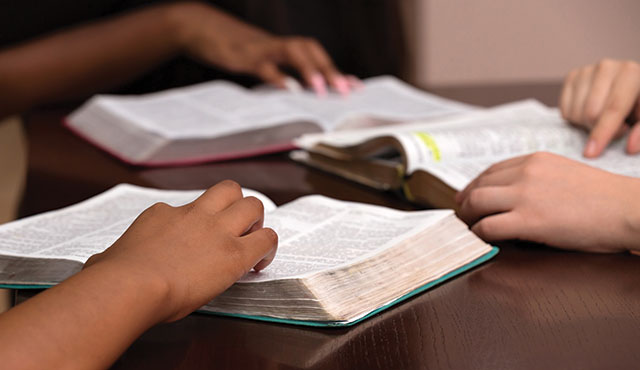An increasing number of Catholic parishes are offering Bible studies to parishioners, with some churches featuring a variety of studies targeted for specific audiences, such as women and young people.
For many Catholics, the idea of studying the Bible is a new concept. As Katie Dawson notes, the Protestants claimed the Scripture as their own in the great divorce called the Reformation, while Catholics held onto the sacraments.
“Many people at the time were illiterate and there was some concern about confusion, so we relied on professionals in the religious class to guide the uneducated in the practice of our faith,” says Dawson, who directs the Office of Parish Faith Formation for the Diocese of Orange.
With a more educated laity, in modern times the Church acknowledges a newfound understanding of the place Scripture should occupy in a life of faith, she adds. Thus, Bible study is a logical next step.
“Saint Jerome famously said, ‘ignorance of Scripture is ignorance of Christ.’ When we understand the broad sweep of the story being told from the first book of Genesis all the way through to the book of Revelations, we see the story of God’s attempt to redeem us and to provide us restoration into relationship with him,” Dawson explains.
“The story tells us over and over again how humans break their relationship with God and how God restores it.” Indeed, she adds, understanding the story is important if we are to understand God’s love for us.
If you’re interested in joining a Bible study, Dawson recommends that you start by inquiring at your parish. In addition, several online tools and video series are available for those who want to start their own study or create a group study.
A phone application called Verbum, available for iPhones and Android phones, offers the Bible and additional resources. The Daily Audio Bible Mobile app also is free of charge and offers a community of readers on the same Scripture journey.
Whether or not you join a Bible study group, Dawson advises, do not start your journey through the Scriptures at the beginning. “By the time you get to Leviticus you’ll give up,” she says. “There’s plenty of stuff in there that’s helpful for scholars, but the average person needs to understand the point and then dig a little deeper.
“John is a very readable book,” she recommends. “It’s beautiful, compelling, and it hangs together; it’s very readable. The other gospels have some coded messages that are really cool when someone decodes them for you, but they have layers of meaning you will not get unless you are being guided in study.”
Above all, she says, don’t give up. “We often do Bible study in fits and starts, but it’s better to do a little something with some regularity than embark on some ambitious plan you can’t live with.”
All Scripture is truthful, says Saint Paul, and the Holy Spirit will move in us as we open ourselves to what is being said in Scripture and how it relates to us in the context of our lives, she says.
“It’s nice when the things we do in church meet multiple needs,” Dawson says. “I know people who have made deep and lasting friendships in Bible study. There is something special about a wide span of different people doing the study together.”

